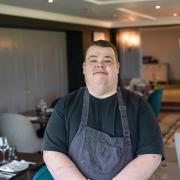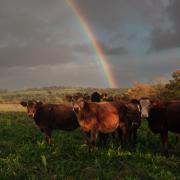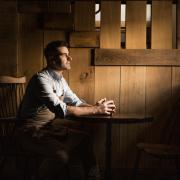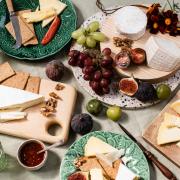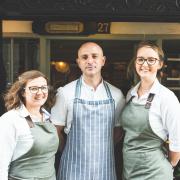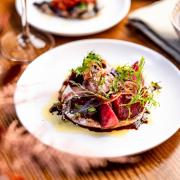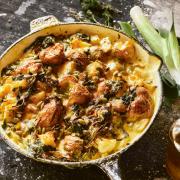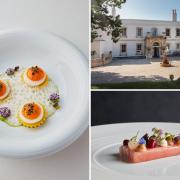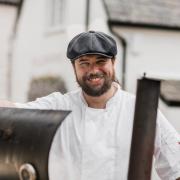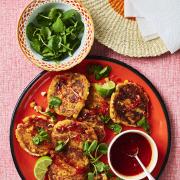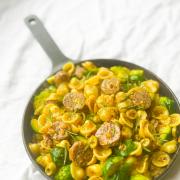Cheesemaking is a complicated and delicate affair, as Catherine Courtenay discovers when she arrives at the home of Devon’s legendary Curworthy Cheese
It was a blazing hot day when I arrived at Stockbeare Farm. It lies at the end of a long track, off the A386, in the depths of the mid Devon countryside. Not far from the farmhouse there’s a large agricultural shed, with a small door which opened to reveal a man dressed in dairy whites. This was head cheesemaker Richard Drake.
Stepping from the heat into a small room there was a smell of melted wax. Richard had been labelling and packing, and the wax is used to coat some of his cheeses.

Curworthy is a legend in Devon’s artisan cheese world, one which was started by a true pioneer, Rachel Stephens. more than 30 years ago. Rachel and her then husband arrived in the county from Wiltshire in 1979, buying the farm and building up a dairy herd. But it was when working at a neighbouring farm, which at the time was owned by Farmers Weekly, that Rachel first learned her skill. When that farm business closed, Rachel took over the cheesemaking, moving it to Stockbeare.
Although the cows are no longer at the farm, the milk is sourced locally from a single herd and production continues apace.
Richard is Rachel’s son-in-law, he and daughter Jo met at school in Okehampton and, after a career in local government working for the fire service, Richard made the switch to cheesemaking. It seems to have been a relatively easy choice - ‘I love cheese!’ he declares. He’s now at the helm in the dairy, although Rachel is still involved, she’s as ‘mad keen as ever’, he says.
A small team work alongside Richard, most are local farmers’ wives, and each have their particular roles. The cheeses are based on a 17th century recipe and all are hand-made. It’s not a cheddar, explains Richard. ‘Ours is a traditional British hard cheese recipe, smoother and creamier and less crumbly.’

As Richard talks through the long, slow and surprisingly delicate process of making cheese, it becomes clear that it’s a lot more complicated than I first thought, and it’s a clever mix of traditional, centuries-old techniques, with modern equipment thrown in. Shiny metal tanks and an impressive looking pasteuriser, sit alongside old wooden cheese presses.
So much is involved, it’s hard to keep track. Tanks are filled, heated, stirred, cooled... The all-Important starters are added, bacteria grows, rennet then sets the milk. It starts to change form, the liquid whey comes out, separating from the curd, to look, ‘a little like scrambled eggs’, as Richard points out.
The cheeses are pressed overnight. Richard picks one up, there’s a slight bulge to the sides, a result of the warmer weather apparently. Cheese is clearly temperamental, it can have different notes or slight changes in flavour depending on the time of year and what the cows are eating and also depending on the surrounding humidity and temperature.
We move from the bright, airy space of the cheesemaking area to an inner room, one which is decidedly cooler and filled with wooden racks, upon which are rows and rows of truckles in different sizes. In one corner are the brining tanks, the baths where cheeses float, absorbing just the right amount of salt. They are flipped and turned every so many hours, to achieve the correct salt absorption.

This is the ripening room and it has a distinct atmosphere, it’s cave-like, due to the constant temperature and the cheeses are almost like living beings, with their developing mould coatings. They are carefully turned every week by a member of the team, Irene, who keeps a careful track of every individual truckle’s needs.
Stepping back into the sunlight outdoors Richard talks about the range of Curworthy cheeses, some of which are developed with food producers and specialist cheese sellers. It seems the cheesemakers’ world is an amicable one where everyone enjoys sharing their passion. It’s quite a network too, just in this little patch of Devon there’s Norsworthy Dairy which makes goats’ cheese down the road and the founders of respected cheese sellers, Country Cheeses, live not far away.
One of the newer Curworthy cheeses is Devon Maid, a soft cheese, more like a brie or camembert, soft not pressed.
Richard says, ‘It came about when customers at farmers’ markets were asking for a soft cheese. Rachel being Rachel said, “Well, let’s do one!” ‘
Going to markets is an important and enjoyable part of the Curworthy calendar, meeting customers and getting their feedback has been an integral part of the business since it began. It also means that the cheesemaker is very much a part of the local community.
Richard is effusive about the strength of their local community, highlighting their nearest town, Hatherleigh. ‘It’s fantastic; I don’t know any other community like it.’
Times have been testing in recent months with both overheads and milk prices going up, but Curworthy seems to be well set up for survival. Despite the strain Richard says, ‘I love doing this. We have a lovely small team of people and Rachel is always so massively positive.
‘This is a passion, a life, and it’s not a bad place to come to work every day.’
Curworthycheese.co.uk

A slice of Curworthy:
Curworthy: a mild and creamy cheese with a buttery taste.
Devon Oke: Matured for longer, with a unique creamy texture but mature aftertaste.
Devon Maid: A soft cheese that is between a brie and a camembert.
Dartmoor Chili The cheese taste comes first, followed by the kick of chilli, using chillies from the Dartmoor Chilli Farm
Chipple: Curworthy with added fresh spring onion.
Devon Smoake: Devon Oke, smoked over oak chippings.
Vintage Oke: Matured for 14 months and with a much drier texture.
Meldon: Curworthy is combined with Chiltern Ale mustard, a wholegrain English mustard blended with spices and a hint of garlic.
Haytor: A gruyere-style with a sweet finish

















